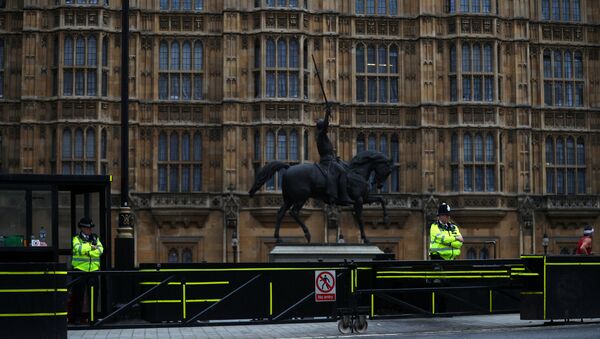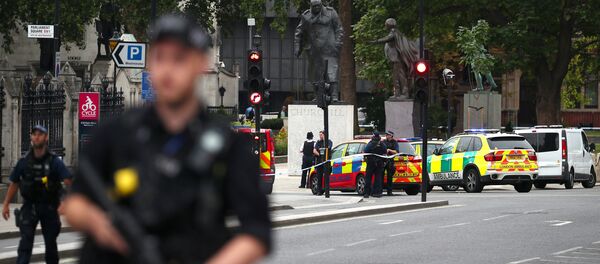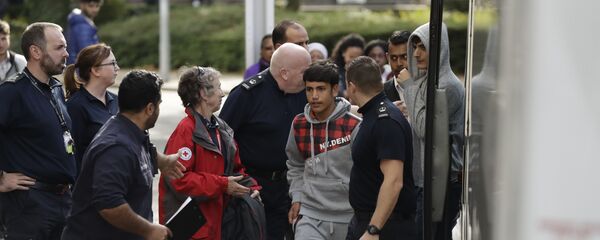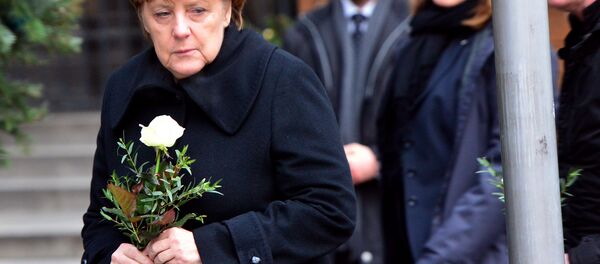Sputnik: Have British authorities released any information on the perpetrator of the attack? What do we know about him?
Erika Brady: We have, in the last short while, received some information where the individual has been identified. Unfortunately, there's very little information to be had at this time. This is relatively soon after an incident like this takes place. What we do know is that the alleged attacker is Mr. Salih Khater, an individual of Sudanese origin from Birmingham in the UK. This is what we currently know about him, but bit by bit we're getting information from people who knew him, or say that they knew him. From what I understand, the authorities are still saying that he is not cooperating with police and therefore it's taking a little more time to establish details on his background..
Sputnik: The perpetrator is not believed to be known to MI5 or Counterterrorism Police; how much of a security threat is that?
Erika Brady: This becomes a very complicated issue. Bearing in mind that this is a day after the event took place and it takes quite a bit of time to piece together the very many elements involved in a suspected terrorist event. Now, this isn't an excuse for the security services, but it is the reality of piecing together what could be large pieces or small pieces of information spread over very large area between various agencies.
I think that it will take some time before we realize what the agencies did or didn't know, but at this time it does not seem apparent that he was on anyone’s radar. This is not surprising given the current trend of low-tech kinds of attacks that we are seeing where someone doesn't necessarily need to be part of a network or a group of people where communications can be intercepted.
So, it becomes quite challenging to prevent people who, in their own homes, just decide to carry out an attack. If indeed this attack is a terrorist attack.
READ MORE: Terror Related Incident in Central London — What We Know So Far
Sputnik: In your view, how organized is the process of monitoring terror suspects in Britain?
Erika Brady: The process is quite organized in Britain, certainly in comparison to what I understand takes place in some other countries. One of the reasons why my research focuses particularly on the UK's counterterrorism strategies is that there is a system for oversight and a system for a review. I'm currently looking into seeing how robust those reviews are.
It is something that is quite strong here, but I think that the security services themselves will agree that there's always room for improvement and this needs to be something that will be learned from because otherwise there's no progress at all. As the tactics of terrorists or people preparing to carry out violence for a particular cause are changing, I think also counterterrorism agencies need to work and change their own processes as well.
Sputnik: Some experts have pointed out that the suspects may not have been linked to a terror organization and may be a copycat; how likely is that?
The event of Westminster which took place last year is likely to inspire other events to take place. It looks like he [Khalid Masood] was successful in that a number of people were killed in the attack last year. So, I think the fact that it's taken place in Westminster does warrant a scrutiny of whether it is a copycat-type issue.
Then again, when we find out more information we might find that there's nothing to do with terrorism here, although the coincidence would be quite strong. Certainly, there's no necessity anymore for individuals to be part of that terrorist organization or a terrorist cell to carry out an attack.
The idea of the new types of terrorism where ISIS [Daesh]-inspired* people to go forth and carry out attacks in people's own countries means that an individual could just decide on a given day that they want to carry out an attack because they want a particular ideology to be supported, or a particular political belief to be aired.
READ MORE: Man Suspected of Terror Offences in London Arrested For Attempted Murder
Sputnik: If we're talking about people who are not linked to terror organizations, what drives them to commit these atrocities?
Erika Brady: I think this is a very difficult question to answer. I know that for many years academics and experts were looking to see if there was a "typical terrorist" and I don't think that these attempts to analyze that have been particularly successful. Obviously, these kinds of things take a long time to assess and to develop.
I think that it's evident of a system of change that's happening. People are becoming more dissatisfied with their governments and with the current status quo, and this is combined with an access to technology and to social media where they can be inspired by a group or a person who seems to be pointing in a direction that looks like it would be more favorable to them.
I think that this potentially becomes a significant point of radicalization and inspiration towards terrorist events or even just events that are violent whether we differentiate them as a terrorist event or just a violent event. What is criminality and what is terrorism becomes challenging to identify and at the same time, terrorism itself is dealt with by most countries as a criminal offense. So in the UK, individuals accused of terrorist acts go through a criminal process.
It's quite difficult to differentiate the two and it's very difficult for the security services to identify where the line goes, whether a person is going to carry out a criminal offense or a terrorist offense which we associate much more with a mass casualty type of incident.
READ MORE: ‘Huge Problem' as UK Government Struggles to Curb Terror — Security Expert
Sputnik: Is it possible at all to prevent these lone wolf attacks?
Erika Brady: I do think that it is possible to prevent some of these attacks. I think that the challenge is immense and I think that it's something that is being worked on significantly by the security services. At the end of the day, nobody can be successful all the time. Can we prevent every single burglary that takes place? Can we prevent every single murder that takes place? No, of course, we can't.
What we can do is to try and reduce it, reduce the impact and mitigate it as much as possible. The security services have released information over the last couple of years to try and become more transparent; there have been a lot of issues with the transparency of these organizations. The data that they have released tries to paint the picture of the counter-terrorism successes that have happened.
But also, maybe their friends and colleagues don't act differently before they carry out an attack, so it becomes very difficult. And with academia we can step in and take a broader and more in-depth picture to support the current police and intelligence services to try and find out how we can prevent these kinds of terrorist attacks taking place, particularly the low-tech types of attacks and the lone actor attacks as well.
Sputnik: Many reports say that roads around the Parliament could be pedestrianized to prevent car ramming incidents; what else could be done to prevent terror attacks?
Erika Brady: One of the hard counterterrorism tactics that has been developed in London for many years would be the physical barriers that have been set up throughout the city which not only protects government buildings, but also public spaces like Trafalgar Square or other areas where people could meet. These particular physical barriers are disguised as such. They are called ‘street furniture’ and they're basically concrete, marble, or stone benches that blend with the surroundings so that people don't even realize that they're sitting on a bench that is there to prevent a car from mounting the pavement and attacking people. These are quite successful. I know that the incident last year on Westminster Bridge when Masood mounted the pavement was a challenge because bridges are difficult areas in which to create barriers in. But that being said, I think that there's an ongoing process of protecting various buildings and areas where people gather through hard barriers. I think those are the positive developments, and they are visible developments as well.
I think CCTV cameras are quite helpful, but perhaps more so after the fact. The processes behind monitoring these in real-time is not very easy to implement and it would be very resource intensive.
I think that there's still a lot of work going on to developing these kinds of counterterrorism measures but at the same time making sure that people feel free to walk about their daily lives without hindrance. I think that one of the big things that the agencies are doing is that they have reviewed their systems from last year and while their report wasn't publicized, there has been some information coming out about the attempt to improve their systems, their interagency collaboration and trying to prevent these individuals from getting to the point where they commit an attack.
Going further back, of course, you're looking to the anti-radicalization or de-radicalization program which is called "Prevent" in the UK. It's very controversial and it works in the pre-crime space, but it is one of the most effective ways to prevent these attacks from happening where we can try and engage with communities and engage with individuals and hopefully prevent them from feeling that they need to carry out these attacks to be heard or to get their ideology represented.
READ MORE: London's Transport Network Purging Potential Terrorists — UK Security Minister
Sputnik: This is not the first time Westminster has experienced a heightened terror risk; what do you see as the main reason for that?
Erika Brady: I think that Westminster is basically at the center of British politics and it's the seat of power in the UK, so Westminster will always be a target. This is not any different from other capitals around the world. I think throughout the past decades and regardless of the types of ideology that various terrorist organizations espouse, the seats of government are always going to be a target.
At the same time, we have to take into consideration that these buildings are usually highly secured. So it seems that those who were intent on attacking the buildings might be satisfied with attacking people around the buildings. Westminster is in the very center of London and the area would have been particularly busy at rush hour which is when this event took place. I think the answer to the question is also combined with the definition of terrorism.
That being said, I think that the strong response of security and emergency services following an attack also sends a strong message. So it really depends on the perspective of the observing group.
Views and opinions expressed in this article are those of Erika Brady and do not necessarily reflect those of Sputnik.
Daesh (also known as ISIS/ISIL/IS) is a terrorist group, banned in Russia.








